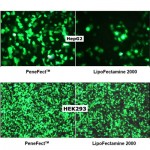Hot Products
Top 100 Antibodies
Customer Testimonials
"I tried FadeStop Fluorescent Mounting Medium with DAPI (272L-00) on fixed samples of Hydra vulgaris. The DAPI staining was bright and fast and the mounting medium effectively preserved fluorescent phalloidin stain. Thank you for an excellent product!"
"The LiDirect™ Lightning Genotyping Kit that I sampled gave clear results and was much more efficient than the methods my lab had been using in the past. With the buffer that is included in the kit, there is no need to make an extraction buffer. Additionally, the quick extraction step (just 15 minut..
















